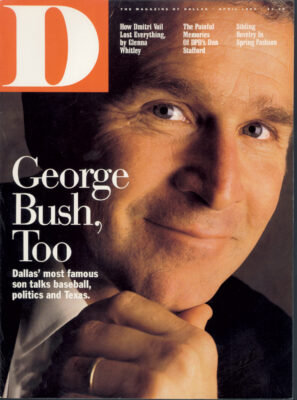OLE ANTHONY IS A STUDY IN contrasts. Contrasting centuries, that is.
Living an austere communal life on a meager $4,000 yearly income, he preaches a message of first-century Christian spirituality-while cooperating with Prime Time Live to expose wealthy televangelists like Robert Tilton, whose orchestra, Anthony says, earns $815,000 a year.
He and his followers at Trinity Foundation celebrate an elaborate list of ancient Jewish feasts and fasts-but they can also enjoy a spliced-together rap version of Til-ton’s vehement denial.
Operating under a virtual vow of poverty, the foundation does not solicit outside donations and owns almost no property. But they’ve got a wide-screen television to show clips of all the shows-including Entertainment Tonight, Inside Edition and the Maury Povich Show-on which Anthony has flayed Tilton and other proponents of the have-it-all gospel. Even though Anthony runs his 20-year-old religious community on a shoestring budget, he travels to the engagements at the foundation’s expense and refuses any payment for these services.
Anthony, a former government spy and political fund-raiser, describes himself as a rabbi who believes in Jesus Christ. Whatever he is, he’s been busy lately.
ALTHOUGH OLE ANTHONY DESCRIBES TlLTON’S WORD OF FAITH ministry as “the BCCI of religion,” he insists that personal dislike had nothing to do with his decision to go, wired for sound, to Tilton’s direct-mail marketing firm, Response Media in Tulsa, where he taped a marketing flak describing the aggressive, multimillion-dollar business of Tilton’s empire. The TV show-and Anthony’s later testimony before an Austin judge-have put a dent in Tilton’s operation, but Anthony says it’s nothing personal. It’s just that Tilton’s whole way of doing the big business of religion runs directly counter to Anthony’s small-is-spiritually-beauti fill approach.
“We begin to worship bigness in America, but the problems can’t be solved by bigness,” Anthony says. “They have to be solved on the basic level of everyday living. Ownership breeds protection.”
Living what they preach, Anthony and the 17 other foundation employees each make $50 a week after paying for their meals, although the foundation provides free health care and housing. The internal tithing of about 100 supporters provides a trickle of cash to keep the place running and provides shelter for the 35 homeless people the foundation takes in. Ml of the foundation’s strategies must be agreed upon unanimously by the 100 or so voting foundation members.
Anthony started the Trinity Foundation in 1972 to serve as a media watchdog for televised religious programs and to generate quality religious programs for broadcast. As Anthony lost interest in religious programming, he shifted the foundation’s goals to include taking in the homeless and building a religious community, moving the foundation in 1985 to Columbia Avenue in old East Dallas. Trinity has restored and added onto the seven stately homes it uses, but refuses to own them or the six condominium apartments that it uses to house the homeless. It’s all part of Anthony’s grand plan to revive mystical first-century Christianity by forming small groups of believers living and working communally with a minimum of possessions. It’s a far cry from the opulence of Tilton’s empire.
Worse than Tilton’s money is his message, as Anthony sees it. He calls the one-way flow of information in television ministries “spiritual masturbation” and considers tel-evangelists con men capitalizing on the alienation of modern life.
“The fracturing of society is the only reason that television evangelists can have an audience. The TV evangelists feed on that fracturing and loneliness,” Anthony says.
By contrast, the Trinity Foundation takes responsibility for its members, some of whom left traditional churches and careers and some of whom were literally plucked from the streets and given new purpose in life by the 53-year-old Norwegian. One of those is Harry Guetzlaff, who turned to Anthony for help after giving his last $5,000 to Tilton. He has been living in the community since 1984.
“Robert Tilton is a spiritual black hole who sucks in all light, all life to feed on for his own purposes,” Guetzlaff says. “Ole Anthony is a point of light. They’re as opposite as it’s possible to be.”
Anthony describes himself as “just the administrator” of the foundation. “I’m almost a tribal chieftain, I guess.” But while everyone is paid the same at the foundation, Anthony is clearly in charge. When he asks for documents, workers bring them promptly. When he approaches others, they give him their full attention.
Oddly enough, Anthony came upon the religious life after being a spy and a Republican organizer. For 11 years, he worked for the Air Force and the Defense Intelligence Agency, traveling the world undercover to investigate groups trying to develop nuclear weapons. He also witnessed 16 atomic explosions at various U. S. government test sites. In fact, he named the Trinity Foundation not after the Holy Trinity or the river that runs through Dallas, but after the location of the first nuclear explosion, Trinity Flats, N.M.
“I thought the foundation should be like an A-bomb going off. It should remove time from the equation. I intuited we needed to shake all things,” says Anthony.
After retiring from the spy business in the mid-1960s, he helped Republican Sen. John Tower raise campaign money and was a Texas coordinator for Goldwater for President ’64. He also was finance chairman for Dallas Mayor Wes Wise’s non-partisan campaign, and ran for the Texas Legislature himself in 1968. He lost.
Anthony next dabbled as a television producer (his résumé lists an associate producer credit on a network special starring Orson Welles) and hosted a late-night talk show on the then-religious Channel 33, as well as two radio talk shows at various times.
In the early 1970s, as a lukewarm Christian, he also tried and rejected the teachings of several traditional churches.
The jump from Goldwater fund-raiser to religious leader was abrupt. Anthony’s consulting firm was helping organizers get a license to start Channel 33, and Anthony broke down while listening to a motivational speaker discuss man’s faith in God.
“I had one of those experiences. Boom. I left time. I could have been gone 1,000 years, although my friends tell me that I sat crying for an hour and a half,” Anthony says. “When you come to the end of yourself, you find God.”
In 1978, Anthony had an early clash with the culture of televangelism when he visited the set of Jim and Tammy Faye Bakker’s PTL television program for an interview about his book Crossfire, a compilation of interviews from his radio shows.
“We went to this garish, white-trash set, with big flowers and big hair, and the lights were on, and we were about to start the interview, when Jim pulled the plug,” Anthony says, claiming the values of poverty and humility in the book’s prologue upset Bak-ker so much he canceled the segment.
ANTHONY IS A SELF-TAUGHT THEOLO-gian who spent 12 years translating the Bible, Torah, Talmud and other ancient religious documents. He has dozens of handwritten notebooks filling the shelves of his office. He finds his truth in the blending of several religious traditions and has reconstructed a three-year Jewish study plan for scriptures that he believes Jesus followed.
“I can honestly say that I am a Muslim, because the word Muslim means one who is submitted to God. I can honestly say I am a Jew, because the Bible defines a Jew as one whose heart is circumcised. I can honestly call myself a Christian, because a Christian is one for whom the Messiah has come,” Anthony says.
His religious philosophy also has followers and supporters among the usually cynical media. A Dallas Morning News reporter and a local radio disc jockey are contributing members of the foundation and own some of the property that the foundation leases. Diane Sawyer sent an autographed picture after the Tilton segment aired. The segment producer sent a portable paper shredder, a joking reference to the thousands of incriminating documents the foundation’s “dumpster divers” discovered in the trash behind the offices of Tilton’s lawyer, J. C. Joyce, in Tulsa.
And while Tilton the Satan-router owns mansions and drives a Mercedes, Anthony the ascetic uses a pontoon-boat Buick borrowed from Joe Bob Briggs. Actually, the car with 81,000 miles on it is on loan from writer John Bloom, Briggs’ alter ego, a longtime friend who now lives in New York City.
Bloom also is helping Anthony negotiate with a “major print media group” for exclusive access to the 20,000 documents on Tilton the foundation has collected- Anthony isn’t looking for money; the foundation paid all of its own expenses during the Tilton investigation and didn’t receive any money from ABC. What he wants is a guarantee the documents will be used for a lengthy investigation into the business of tele-vangelism. His muckraking has brought threats of lawsuits from Tilton, but none have been filed, probably because of Anthony’s careful wording and thorough documentation.
Not all of Anthony’s dragons have been slain, however. Although his undercover work on Tilton’s ministry helped start investigations by the U.S. Postal Service, the IRS, the FBI and the Texas attorney general, he’s seen less progress with his ambitious but naive Dallas Project, a plan to have every church and synagogue in America take in one homeless person.
“The problem is the churches aren’t set up to do what we [at Trinity] do. We’ve got the housing, but there’s no structure to do that in most churches,” Anthony says. “But how churches deal with the homeless is how God is going to deal with us.”
And the foundation plugs away. Seven Bible study groups meet every week. They’ve knocked out a wall in one of the homes to create space for Alcoholics Anonymous and Narcotics Anonymous meetings, and the 12-pupil private school the foundation started two years ago just got new science books. Amidst the activity, Anthony continues to provide not orchestras, phone banks and prayer cloths, but a real religious community.
For Eddie Jones, that all-encompassing community is the only way he can deal with his addictions. “Before I got here, I would go use [drugs] or get drunk whenever I had a bad day. Here, they want you to share your feelings,” says Jones, who has lived in the community for a year. “It takes the pressure off, and it gives you something to strive for.”
For his next projects, Anthony wants to have a national board of psychiatrists analyze videotapes of Tilton and hopes to locate some land for a large garden to cut the costs of feeding his flock.
“We’re not going to get much bigger than this. We won’t go beyond 100 or 120 people total,” Anthony says. “After that, it will be working on duplicating this community in other places.”
In a world where there’s not much left to believe in, Anthony’s brand of frugal mysticism makes it tempting to ponder the cosmos from Columbia Avenue, with or without Joe Bob Briggs’ Buick.
Get our weekly recap
Brings new meaning to the phrase Sunday Funday. No spam, ever.
Related Articles

Media
Will Evans Is Now Legit
The founder of Deep Vellum gets his flowers in the New York Times. But can I quibble?
By Tim Rogers

Restaurant Reviews
You Need to Try the Sunday Brunch at Petra and the Beast
Expect savory buns, super-tender fried chicken, slabs of smoked pork, and light cocktails at the acclaimed restaurant’s new Sunday brunch service.

Arts & Entertainment
DIFF Preview: How the Death of Its Subject Caused a Dallas Documentary to Shift Gears
Michael Rowley’s Racing Mister Fahrenheit, about the late Dallas businessman Bobby Haas, will premiere during the eight-day Dallas International Film Festival.
By Todd Jorgenson


